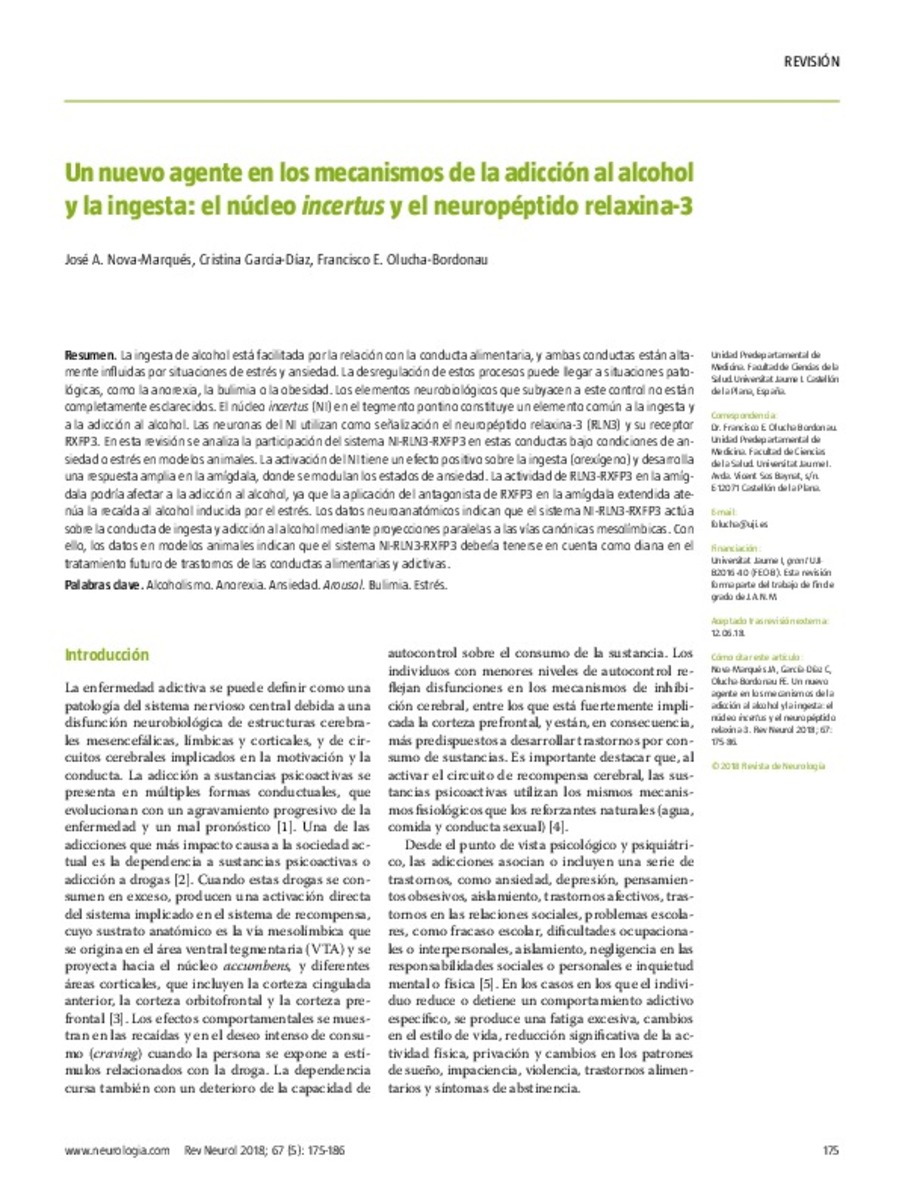Mostrar el registro sencillo del ítem
Un nuevo agente en los mecanismos de la adicción al alcohol y la ingesta: el núcleo incertus y el neuropéptido relaxina-3
| dc.contributor.author | Nova Marqués, José Antonio | |
| dc.contributor.author | García Díaz, Cristina | |
| dc.contributor.author | Olucha-Bordonau, Francisco E | |
| dc.date.accessioned | 2019-04-08T18:39:53Z | |
| dc.date.available | 2019-04-08T18:39:53Z | |
| dc.date.issued | 2018 | |
| dc.identifier.citation | NOVA MARQUÉS, J. A.; GARCÍA DÍAZ, C.; OLUCHA BORDONAU, F. E. Un nuevo agente en los mecanismos de la adicción al alcohol y la ingesta: el núcleo incertus y el neuropéptido relaxina-3. Revista de Neurología, 2018, vol. 67, núm. 5, p. 175-186 | ca_CA |
| dc.identifier.issn | 1576-6578 | |
| dc.identifier.issn | 0210-0010 | |
| dc.identifier.uri | http://hdl.handle.net/10234/182256 | |
| dc.description.abstract | La ingesta de alcohol está facilitada por la relación con la conducta alimentaria, y ambas conductas están altamente influidas por situaciones de estrés y ansiedad. La desregulación de estos procesos puede llegar a situaciones patológicas, como la anorexia, la bulimia o la obesidad. Los elementos neurobiológicos que subyacen a este control no están completamente esclarecidos. El núcleo incertus (NI) en el tegmento pontino constituye un elemento común a la ingesta y a la adicción al alcohol. Las neuronas del NI utilizan como señalización el neuropéptido relaxina-3 (RLN3) y su receptor RXFP3. En esta revisión se analiza la participación del sistema NI-RLN3-RXFP3 en estas conductas bajo condiciones de ansiedad o estrés en modelos animales. La activación del NI tiene un efecto positivo sobre la ingesta (orexígeno) y desarrolla una respuesta amplia en la amígdala, donde se modulan los estados de ansiedad. La actividad de RLN3-RXFP3 en la amígdala podría afectar a la adicción al alcohol, ya que la aplicación del antagonista de RXFP3 en la amígdala extendida atenúa la recaída al alcohol inducida por el estrés. Los datos neuroanatómicos indican que el sistema NI-RLN3-RXFP3 actúa sobre la conducta de ingesta y adicción al alcohol mediante proyecciones paralelas a las vías canónicas mesolímbicas. Con ello, los datos en modelos animales indican que el sistema NI-RLN3-RXFP3 debería tenerse en cuenta como diana en el tratamiento futuro de trastornos de las conductas alimentarias y adictivas. | ca_CA |
| dc.description.abstract | Alcohol intake is facilitated by its relationship with eating behavior and both processes are highly influenced by situations of stress and anxiety. The dysregulation of these processes can reach pathological situations such as anorexia, bulimia or obesity. The neurobiological elements which underlie this control are not completely clarified. The nucleus incertus (NI) in the pontine tegmentum is a common element in the food intake and alcoholism. NI is characterized by using the neuropeptide relaxin-3 (RLN3) as transmitter and its receptor RXFP3. In the present review, we will analyze the participation of the NI-RLN3-RXFP3 system in these behaviors under conditions of anxiety or stress in animal models. The activation of NI has a positive effect on intake (orexigenic) and generates a wide response in the amygdala modulating anxiety states. The activity of RLN3-RXFP3 in the amygdala could affect alcohol addiction since the application of the RXFP3 antagonist in extended amygdala attenuates the relapse to alcohol induced by stress. The neuroanatomical data indicate that the NI-RLN3-RXFP3 system acts on the feeding behavior and alcohol intake by means of projections parallel to the canonical mesolimbic pathways. Thus, data in animal models indicate that the NI-RLN3-RXFP3 system should be taken into account as a target in the future treatment of disorders of eating and alcohol addictive behaviors. | ca_CA |
| dc.format.extent | 12 p. | ca_CA |
| dc.format.mimetype | application/pdf | ca_CA |
| dc.language.iso | spa | ca_CA |
| dc.publisher | Viguera Editores | ca_CA |
| dc.relation.isPartOf | Revista de Neurología, 2018, vol. 67, núm. 5, p. 175-186 | ca_CA |
| dc.rights | © 2018 Revista de Neurología | ca_CA |
| dc.rights.uri | http://rightsstatements.org/vocab/InC/1.0/ | * |
| dc.subject | alcoholismo | ca_CA |
| dc.subject | anorexia | ca_CA |
| dc.subject | ansiedad | ca_CA |
| dc.subject | arousal | ca_CA |
| dc.subject | bulimia | ca_CA |
| dc.subject | estrés | ca_CA |
| dc.subject | alcoholism | ca_CA |
| dc.subject | anxiety | ca_CA |
| dc.subject | stress | ca_CA |
| dc.title | Un nuevo agente en los mecanismos de la adicción al alcohol y la ingesta: el núcleo incertus y el neuropéptido relaxina-3 | ca_CA |
| dc.title.alternative | A new agent in the mechanisms underlying addiction and ingestion of alcohol: the nucleus incertus and the neuropeptide relaxin-3 | ca_CA |
| dc.type | info:eu-repo/semantics/article | ca_CA |
| dc.identifier.doi | https://doi.org/10.33588/rn.6705.2017454 | |
| dc.relation.projectID | Universitat Jaume I, grant UJIB2016- 40 (FEO-B). Esta revisión forma parte del trabajo de fin de grado de J.A.N.M. | ca_CA |
| dc.rights.accessRights | info:eu-repo/semantics/openAccess | ca_CA |
| dc.relation.publisherVersion | https://www.neurologia.com/articulo/2017454 | ca_CA |
| dc.type.version | info:eu-repo/semantics/publishedVersion | ca_CA |
Ficheros en el ítem
Este ítem aparece en la(s) siguiente(s) colección(ones)
-
MED_Articles [641]
Articles de publicacions periòdiques







